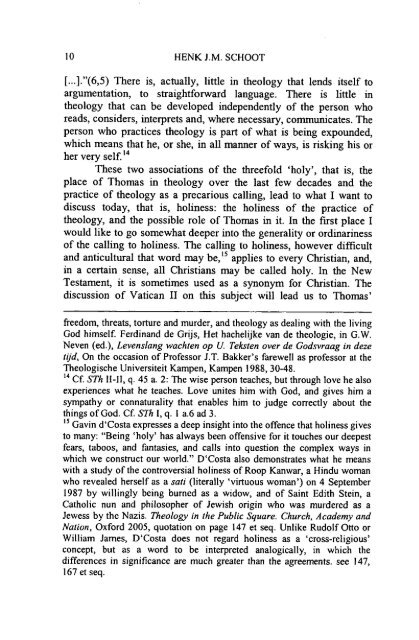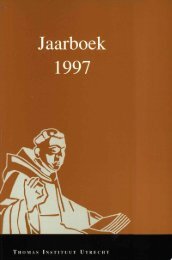Jaarboek Thomas Instituut 2006 - Thomas Instituut te Utrecht
Jaarboek Thomas Instituut 2006 - Thomas Instituut te Utrecht
Jaarboek Thomas Instituut 2006 - Thomas Instituut te Utrecht
You also want an ePaper? Increase the reach of your titles
YUMPU automatically turns print PDFs into web optimized ePapers that Google loves.
10 HENK lM. SCHOOT<br />
[...]."(6,5) There is, actually, little in theology that lends itself to<br />
argumentation, to straightforward language. There is little in<br />
theology that can be developed independently of the person who<br />
reads, considers, in<strong>te</strong>rprets and, where necessary, communica<strong>te</strong>s. The<br />
person who practices theology is part of what is being expounded,<br />
which means that he, or she, in all manner of ways, is risking his or<br />
her very self."<br />
These two associations of the threefold 'holy', that is, the<br />
place of <strong>Thomas</strong> in theology over the last few decades and the<br />
practice of theology as a precarious calling, lead to what I want to<br />
discuss today, that is, holiness: the holiness of the practice of<br />
theology, and the possible role of <strong>Thomas</strong> in it. In the first place I<br />
would like to go somewhat deeper into the generality or ordinariness<br />
of the calling to holiness. The calling to holiness, however difficult<br />
and anticultural that word may be,15applies to every Christian, and,<br />
in a certain sense, all Christians may be called holy. In the New<br />
Testament, it is sometimes used as a synonym for Christian. The<br />
discussion of Vatican II on this subject will lead us to <strong>Thomas</strong>'<br />
freedom, threats, torture and murder, and theology as dealing with the living<br />
God himself. Ferdinand de Grijs, Het hachelijke van de theologie, in G.W.<br />
Neven (ed.), Levenslang wach<strong>te</strong>n op U. Teks<strong>te</strong>n over de Godsvraag in deze<br />
tijd, On the occasion of Professor IT. Bakker's farewell as professor at the<br />
Theologische Universi<strong>te</strong>it Kampen, Kampen 1988, 30-48.<br />
14 Cf. STh II-II, q. 45 a. 2: The wise person <strong>te</strong>aches, but through love he also<br />
experiences what he <strong>te</strong>aches. Love uni<strong>te</strong>s him with God, and gives him a<br />
sympathy or connaturality that enables him to judge correctly about the<br />
things of God. Cf. STh I, q. I a.6 ad 3.<br />
15 Gavin d'Costa expresses a deep insight into the offence that holiness gives<br />
to many: "Being 'holy' has always been offensive for it touches our deepest<br />
fears, taboos, and fantasies, and calls into question the complex ways in<br />
which we construct our world." D'Costa also demonstra<strong>te</strong>s what he means<br />
with a study of the controversial holiness of Roop Kanwar, a Hindu woman<br />
who revealed herself as a sati (li<strong>te</strong>rally 'virtuous woman') on 4 Sep<strong>te</strong>mber<br />
1987 by willingly being burned as a widow, and of Saint Edith S<strong>te</strong>in, a<br />
Catholic nun and philosopher of Jewish origin who was murdered as a<br />
Jewess by the Nazis. Theology in the Public Square. Church, Academy and<br />
Nation, Oxford 2005, quotation on page 147 et seq. Unlike Rudolf Otto or<br />
William James, D'Costa does not regard holiness as a 'cross-religious'<br />
concept, but as a word to be in<strong>te</strong>rpre<strong>te</strong>d analogically, in which the<br />
differences in significance are much grea<strong>te</strong>r than the agreements. see 147,<br />
167 et seq.








